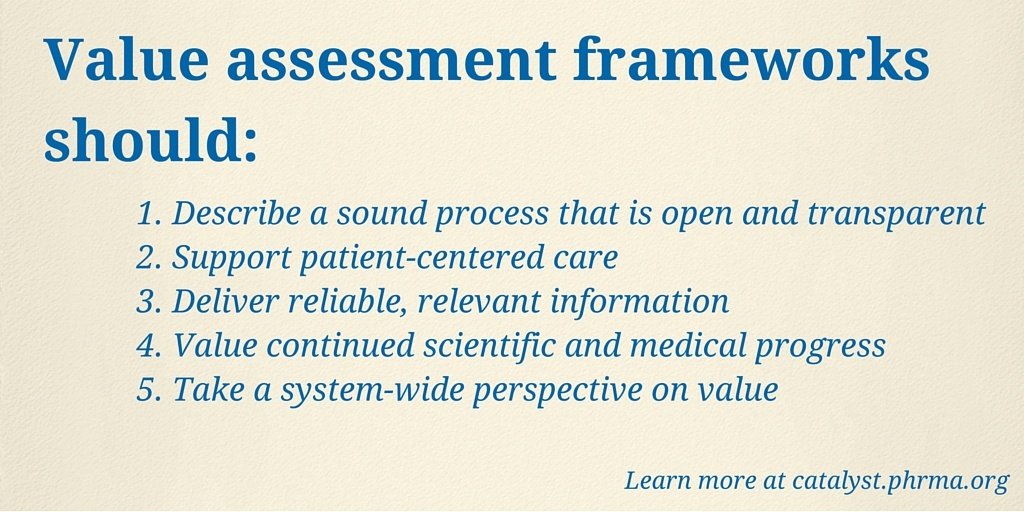
As the U.S. health care market evolves toward a system that better recognizes and rewards value, we face a pressing need to develop tools and solutions to empower informed patient-physician decision-making and ensure individuals have a say in the direction of their care. There is no single “right” approach to determining patient values and needs. PhRMA supports solutions for value-driven health care that are market-based and that help patients and providers make well-informed, individualized decisions.
Rather than creating centralized standards and national one-size-fits-all value judgments, it is important to advance pragmatic, market-based solutions to help patients and consumers make well-informed decisions. Frameworks that help patients and consumers assess the value of medical tests, medicines and health care services could be one of many useful tools to support a market-based health care system that is both value-driven and patient-centered.
To help get these tools right, today we released new value assessment framework principles. Frameworks incorporating these principles can improve health care decision-making and the efficiency of our health care system. Frameworks inconsistent with these principles will make it more difficult for patients to obtain health care and treatments that best meet their needs and discourage continued medical progress.
 The ongoing debate over the development and use of value assessment frameworks illustrates the lack of consensus around a single approach to determining patients’ needs and values and why this task is so complicated. The range of established and emerging value assessment frameworks use a variety of tools and procedures and are intended to inform a range of health care decisions. At the same time, it is critical these frameworks are not misapplying value through centralized, one-size-fits-all coverage or payment restrictions. Some frameworks, like the one developed by the Institute for Clinical and Economic Review (ICER), are particularly worrisome because of flaws in their models and assumptions, lack of inclusion of patient perspectives and vulnerability to misuse that would limit patient access to individualized care. In fact, in response to ICER’s framework, the Asthma and Allergy Foundation of America expressed concern that the ICER’s framework “appears to have been constituted with little input from patients,” and that the product-specific assessment “appears primarily to have been configured to assess outcomes as payers see and value them.”
The ongoing debate over the development and use of value assessment frameworks illustrates the lack of consensus around a single approach to determining patients’ needs and values and why this task is so complicated. The range of established and emerging value assessment frameworks use a variety of tools and procedures and are intended to inform a range of health care decisions. At the same time, it is critical these frameworks are not misapplying value through centralized, one-size-fits-all coverage or payment restrictions. Some frameworks, like the one developed by the Institute for Clinical and Economic Review (ICER), are particularly worrisome because of flaws in their models and assumptions, lack of inclusion of patient perspectives and vulnerability to misuse that would limit patient access to individualized care. In fact, in response to ICER’s framework, the Asthma and Allergy Foundation of America expressed concern that the ICER’s framework “appears to have been constituted with little input from patients,” and that the product-specific assessment “appears primarily to have been configured to assess outcomes as payers see and value them.”
Successful frameworks should incorporate principles such as the following to ensure they accommodate individual patient needs and that high-quality care is not sacrificed:
- Describe a sound process that is open and transparent, with opportunity for input and a strong role for patients and physicians.
- Support patient-centered care by considering patient preferences and heterogeneity, appropriately communicating results and avoiding misuse.
- Deliver reliable, relevant information by using rigorous, transparent methods that rely on the full range of evidence and prioritize longer-term and broader outcomes.
- Value continued scientific and medical progress by accounting for personalized medicine, the step-wise nature of medical progress and the inherent value of innovation.
- Take a system-wide perspective on value by examining the full range of tests, treatments, care management approaches and health care services.
View the full set of principles here.
Read how value assessment frameworks fit within PhRMA’s pragmatic, patient-centric approaches to building a stronger U.S. health care market here.




 The ongoing debate over the development and use of value assessment frameworks illustrates the lack of consensus around a single approach to determining patients’ needs and values and why this task is so complicated. The range of established and emerging value assessment frameworks use a variety of tools and procedures and are intended to inform a range of health care decisions. At the same time, it is critical these frameworks are not misapplying value through centralized, one-size-fits-all coverage or payment restrictions. Some frameworks, like the one developed by the Institute for Clinical and Economic Review (ICER), are particularly worrisome because of flaws in their models and assumptions, lack of inclusion of patient perspectives and vulnerability to misuse that would limit patient access to individualized care. In fact, in response to ICER’s framework, the Asthma and Allergy Foundation of America expressed concern that the ICER’s framework “appears to have been constituted with little input from patients,” and that the product-specific assessment “appears primarily to have been configured to assess outcomes as payers see and value them.”
The ongoing debate over the development and use of value assessment frameworks illustrates the lack of consensus around a single approach to determining patients’ needs and values and why this task is so complicated. The range of established and emerging value assessment frameworks use a variety of tools and procedures and are intended to inform a range of health care decisions. At the same time, it is critical these frameworks are not misapplying value through centralized, one-size-fits-all coverage or payment restrictions. Some frameworks, like the one developed by the Institute for Clinical and Economic Review (ICER), are particularly worrisome because of flaws in their models and assumptions, lack of inclusion of patient perspectives and vulnerability to misuse that would limit patient access to individualized care. In fact, in response to ICER’s framework, the Asthma and Allergy Foundation of America expressed concern that the ICER’s framework “appears to have been constituted with little input from patients,” and that the product-specific assessment “appears primarily to have been configured to assess outcomes as payers see and value them.”